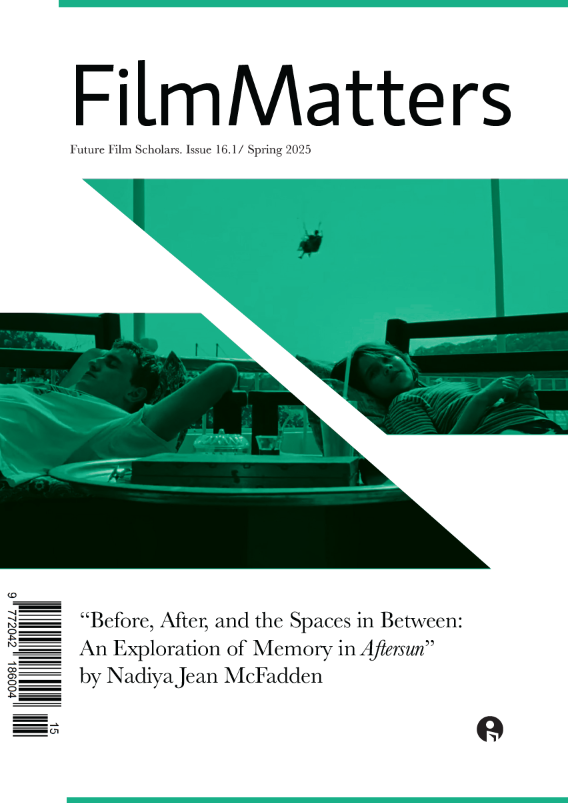In “How to Tell the Difference Between a Hot Take and a Good Idea,” critic and essayist Jia Tolentino describes a “hot take” as a piece of writing that’s “primarily gestural” and “primarily based on reaction—both the illusory need to react, and the idea that a reaction is worth paying attention to simply because it exists.” She defines a “hot take” as “close to [her] personal definition of trolling.” Innumerable magazines and media sites ridicule the “hot take” as shallow and superficial clickbait; in Spring 2025, we sought to transform the notion of the hot take into a substantive yet brief piece of film criticism.
In a collaboratively written Call for Papers that we circulated widely, we asked our fellow undergraduate peers for their hot takes, and we conveyed our hopes that they would contribute to our dossier. As the world moves more quickly and existing structures (and forms of culture) risk disappearance, we wanted to build a collection of film-focused and impassioned arguments. We asked students to add their voices to this chorus and to contribute their reflections, such that all of us—as editors, writers, students, audiences, humans—might appreciate how movies can offer a source of comfort, connection, debate, and discovery.
We gave our undergraduate peers the following prompts to structure their writing. We encouraged them to choose a film that fulfills one of the following criteria:
- A movie that’s popular that you don’t like, or a movie that you love that’s unpopular (note: avoid “strawman” arguments about “what critics say” so as to differentiate your voice by comparison; if you choose this option, briefly establish, as convincingly as possible, the general consensus against which you’re arguing via either critical [quote an established critic’s words] or popular [box-office data] contexts). You might turn to Rotten Tomatoes aggregate numbers (imprecise as they might be) as one way of establishing data for a beloved or critically derided film. (You might, for example, explore the redemptive value of a film that’s considered “cringe cinema…films that encourage our compassion or conversely, provoke our contempt,” as Aidan O’Malley argues in a recent issue of Film Matters).
- A movie that you read against the grain, as in, a film that’s conventionally thought of as mainstream that you perceive as having revolutionary or inspiring potential (i.e., a film might not explicitly include a gay character but could nonetheless have queer underpinnings, e.g., Frankenstein [1932] or High School Musical [2006]; or maybe you appreciate genre’s affordances in unconventional ways, e.g., Die Hard [1988] as the perfect breakup movie). In other words, write about a film that surprises you for the better.
We explained that a flash essay should be built of strong feelings and also should elicit strong feelings from your readers. We expected writing that would—more than a screen rant, paean, or manifesto—offer brief analysis of the film via details (about character, film techniques, history, etc.) that make and support their arguments. We encouraged students to focus on one scene or moment that supports their argument and encapsulates their ideas most vividly. What, within this scene/moment, does the writer despise or celebrate? What, here, do they find uplifting, disappointing, inspiring, compelling, and how? We asked for 250-750 words of students’ most polished, detail-rich, exacting, precise, inspired prose.
We conveyed to our writers what we now convey to our readers: at the heart of this project is a commitment to movies and art as transformative, meaningful, and central to our lives. Implicit in this call and now in this dossier there is a chance to have a broader conversation about survival within tumultuous times, about belonging to and finding community through divergent perspectives. Participating in this dossier—as writers, readers, and editors—gave all of us, from a variety of colleges, a chance to learn from each other through sharing our ideas about film.
Sincerely,
Georgia Tech Online Editorial Board
Thomas Avery
Corbin Bean
Jenesis Bronner
Camryn Bryant
Amanda Cowan
Chandler Fortune
Nakai Jack
Hannah Marsh
Abigail Reams
Ella Rowsey
Sloan Salinas
Beth Stengell
Sophia Voyles
Sallie Kate Worley
Contents
- Better Man, by River Waters
- Diary of a Wimpy Kid, by Faith Hardie
- Dune 2, by Preston Gambrell
- The Exorcist, by Ari Hammond
- Ferris Bueller’s Day Off, by Nicole McKendrick
- Fish Tank, by Manie Joses
- Her, by Max Chouinard
- Inception, by Erica Freeman-Carter
- Kaguya-sama: Love Is War, by Minh Le
- La La Land, by Mackenzie McCarron
- La La Land, by Stephen Rini
- The Lone Ranger, by Kloe Kelly
- The Lorax, by Maddie Gill
- Mad Max: Fury Road, by Ethan Gerrard
- Marriage Story, by Brealin Maya
- Pulp Fiction, by Annie-Faith Obed
- Requiem for a Dream, by Ezra Minard
- Scooby-Doo, by Saige Gipson
- Scooby-Doo, by Roxana Sherahmad
- Shark Tale, by Katie Arce
- Tomorrowland, by Alyssa Pope
- Touki Bouki, by Miles Hart
- Uptown Girls, by Mia Mattern








































